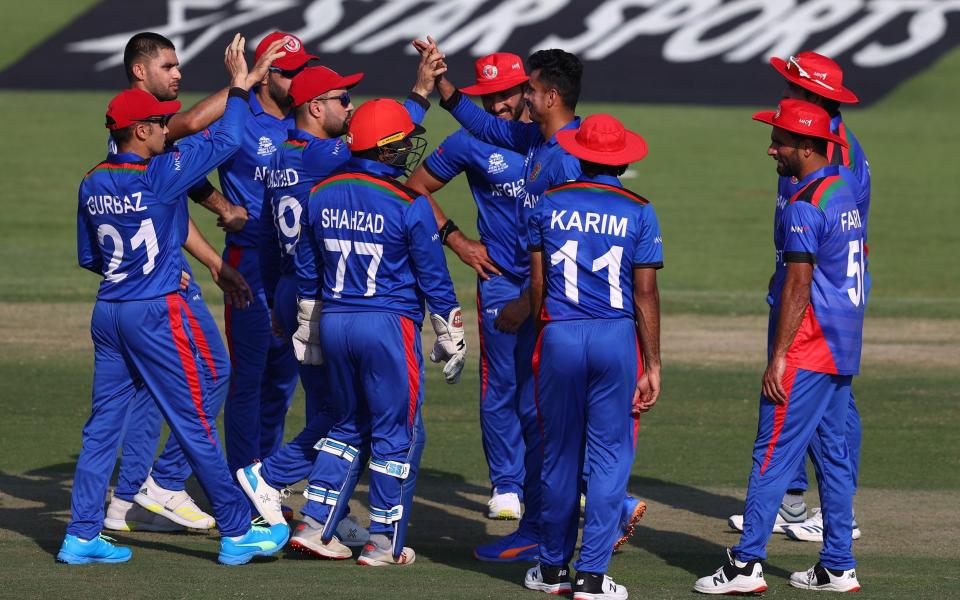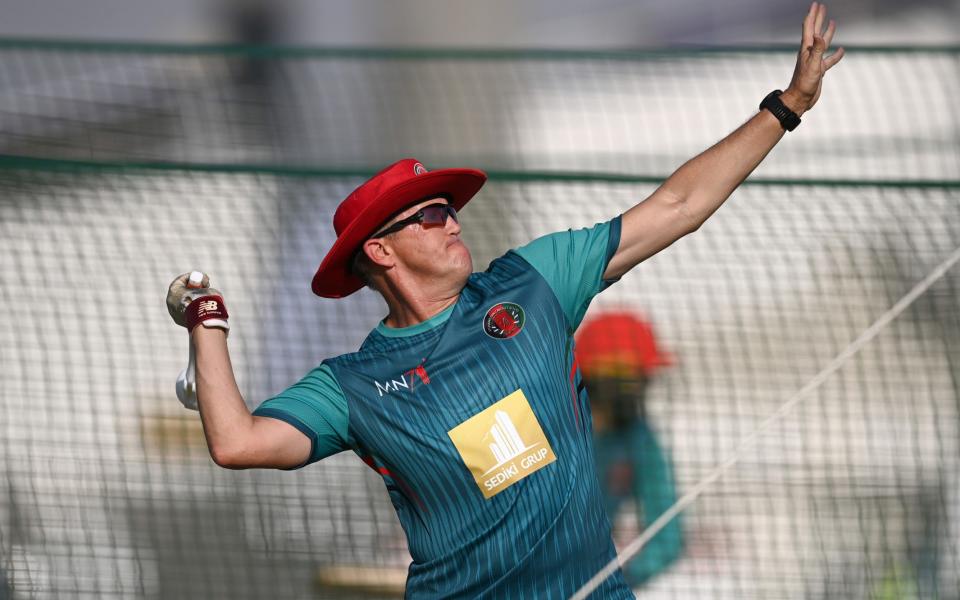Andy Flower: 'Afghanistan cricket story is a beacon of hope for people'

Few men are as familiar with the power of sport as Andy Flower. Eighteen years ago, Flower and Henry Olonga wore black armbands during the ODI World Cup in protest against the death of democracy in Zimbabwe.
Yet when Flower was asked to work as a team consultant for Afghanistan during the T20 World Cup, he had no hesitation. Flower, naturally, is deeply aware of the turmoil in the country in the wake of the Taliban recapturing control. But he is convinced that the Afghanistan men’s side, who only played their first official match in 2004 and yet have a strong chance of qualifying for the semi-finals, remain a wider force for good.
“There is more to play for here than just doing well,” Flower says ahead of Afghanistan’s opening World Cup game today against Scotland in Sharjah. “They are very passionate about representing their country well, and giving their supporters back home something really to be proud of. And I like that sort of cause. So it’s really great to be involved.”
Before accepting the post to work with Afghanistan during the tournament, Flower considered the wider situation in the country. It only made him keener to take on the role. “They’ve had such a hard time over the last couple of decades, and longer. And within all that turmoil and insecurity in their country they have done amazing things as a group of cricketers.”
Flower rejects the notion that, if Afghanistan are successful, that will be used for the Taliban’s own ends. “I haven’t given that a moment’s thought. Remember that this team is representing Afghanistan and the people of Afghanistan.”
Instead, Flower believes that if the team thrive, it will provide a little solace to those in Afghanistan. In Afghanistan, the Taliban takeover will not preclude people from following the tournament on TV and online.
“Cricket has done an enormous amount of good in that country. And really their cricketing story is an amazing story. And I think for the cricketers here they are keeping it as simple as that – what are we going to do? Can we do something special with this opportunity that we have in the T20 World Cup in 2021?”

Despite the language barrier, Flower has had chats with several players about the situation back home. “It’s really interesting to listen to these guys talk about their country and their families and the sport in the context of a country that’s going through change and, inevitably, quite a lot of hardship.”
It is possible, though not likely, that when the International Cricket Council board meets after the T20 World Cup it will opt to suspend Afghanistan on account of the Taliban’s ban of women playing the game. But Flower does not believe that suspending Afghanistan from the world game would achieve any good. “The Afghanistan cricket story is an amazing story and it’s obviously ongoing, and something that the Afghanistan public, and anyone involved in cricket in Afghanistan is extremely proud of. And it’s a beacon of hope for a lot of people in Afghanistan.
“In the bigger picture, I hope that this is just the start of their story. And from what I can see I think that that will be the case. Their cricket is going to go from strength to strength. It’s the national sport and it is also an opportunity to get out and see other parts of the world and also provides an outstanding income for individuals that are good enough to get into those situations.”
Though Flower is new to his role in Afghanistan, he has long been impressed with the Afghans he has come across on the T20 circuit.
“I really like their attitude and the way they go about stuff. They play really aggressively. They are brave out there in competition. They work hard in the field, they’re model pros off the field, they’re in the gym every day. When they are in franchise competitions, they sort of get together and do their gym work together. And I really respect what they’ve done with the game in their country as well.”
Indeed, Flower sees parallels between the importance of cricket now in Afghanistan and during Zimbabwe during his international career, from 1992 to 2003. “One of our big drivers in our very early days when we were initially given Test status was, No 1, sort of justifying that status by the quality of our play as a team. No 2, representing our country and making sure that we were proud about what we were delivering as a group. And I definitely recognise some of those similar feelings in this group.”
Working with Afghanistan will add to Flower’s experiences in the T20 circuit since ending all involvement with England in 2019. In the Pakistan Super League, Caribbean Premier League and the Hundred, Flower has a fine record, with a win percentage of 56 from 55 games - highly impressive given that T20 leagues are designed to ensure competitive balance.
In a franchise league or his role with Afghanistan now, “you aren’t necessarily trying to change anything major,” Flower says. “But there might be some tweaks and minor influences that you can have on people that confirm their self-belief. And, perhaps, guide them against a particular opposition in particular conditions.”
At times during his stint with England, whom he led to the T20 World Cup in 2010 and the top of the Test rankings, Flower was viewed as austere. Now, he says: “As my coaching has evolved I’ve tended to focus more on people’s strengths. It’s a nicer way to coach, and it builds people’s self-esteem and self-confidence, which is absolutely crucial.”

This does not mean that Flower ignores a team’s weaknesses. In this tournament, he is particularly focused on how Afghanistan can rotate the strike more after the power play. But, he believes, whether Afghanistan can get the runs to support their brilliant spin trio – Rashid Khan, Mujeeb Zadran and captain Mohammad Nabi add up to probably the best spin attack in the competition – will be determined more by their attacking top three.
Led by the electric Rahmanullah Gurbaz, Afghanistan’s top order adopt a similar approach to the West Indies, playing out a high number of dot balls but aiming to hit more boundaries than their opponents.
“That might determine how well we do with the bat – whether we can continue that boundary hitting. Boundary hitting and outscoring the opposition in terms of boundaries is very important to your chances of success in T20,” Flower says.
He has already enjoyed a remarkable life in cricket. But the weeks ahead could offer one of Flower’s most enriching experiences yet.
“We want to qualify. There’s no doubt about that. It is an opportunity there to be grabbed. We’re good enough to do it,” he says. “We hope to have a really special month of our lives together.”

 Yahoo News
Yahoo News 
